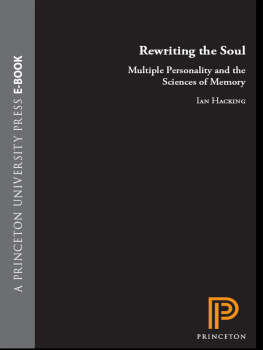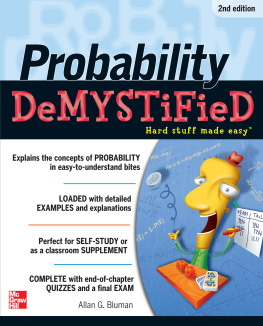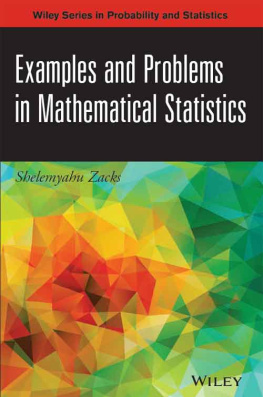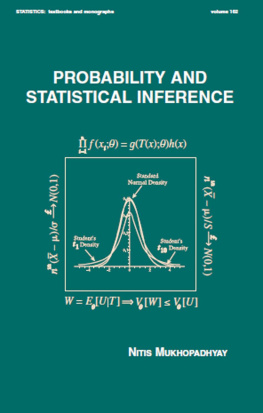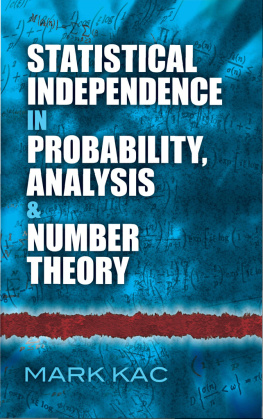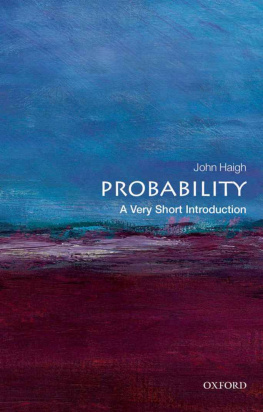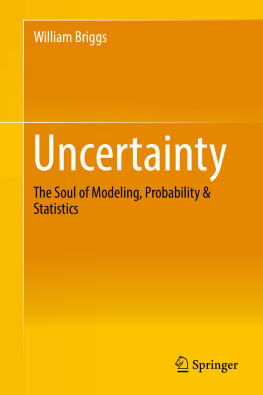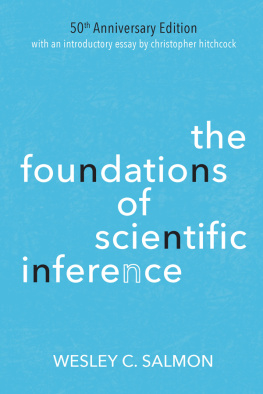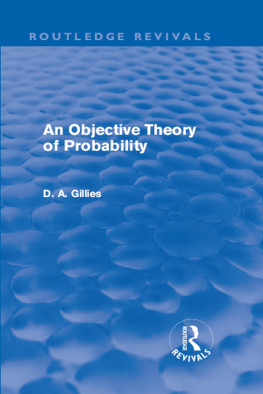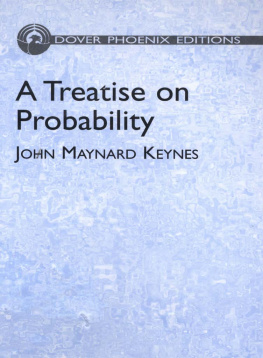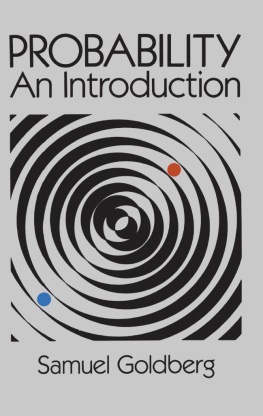THE EMERGENCE OF PROBABILITY
Second Edition
Historical records show that there was no real concept of probability in Europe before the mid-seventeenth century, although the use of dice and other randomizing objects was commonplace. Ian Hacking here presents a philosophical critique of early ideas about probability, induction, and statistical inference and the growth of this new family of ideas in the fifteenth, sixteenth, and seventeenth centuries. The contemporary debates center around figures such as Pascal, Leibniz, and Jacques Bernoulli.
What brought about the change in ideas? Hacking invokes a wider intellectual framework involving the growth of science, economics, and the theology of the period. He argues that the transformations that made it possible for probability concepts to emerge have constrained all subsequent development of probability theory and determine the space within which philosophical debate on the subject is still conducted.
This book was first published in 1975, when it opened up a whole new field of historical and philosophical studies of the very idea of probability. This edition includes a new introduction in which Hacking explains how Michel Foucaults archaeology enabled him to do this. It concludes with reflections on the immense body of work done by others after the first publication of this book.
Ian Hacking is Professor Emeritus at the Collge de France (Chair of philosophy and history of scientific concepts) and University Professor Emeritus at the University of Toronto. His many books include Representing and Intervening, Probability and Inductive Logic, Rewriting the Soul, Mad Travelers, Historical Ontology, and The Social Construction of What? The Modern Library included Hackings The Taming of Chance a sequel to Emergence in its list of 100 best non-fiction works published in the twentieth century.
THE EMERGENCE OF PROBABILITY
A PHILOSOPHICAL STUDY OF
EARLY IDEAS ABOUT PROBABILITY, INDUCTION AND STATISTICAL INFERENCE
Second Edition
IAN HACKING

CAMBRIDGE UNIVERSITY PRESS
Cambridge, New York, Melbourne, Madrid, Cape Town, Singapore, So Paulo, Delhi, Dubai, Tokyo, Mexico City
Cambridge University Press
The Edinburgh Building, Cambridge CB2 8RU, UK
Published in the United States of America by Cambridge University Press, New York
www.cambridge.org
Information on this title: www.cambridge.org/9780521866552
Ian Hacking 1975, 2006
This publication is in copyright. Subject to statutory exception and to the provisions of relevant collective licensing agreements, no reproduction of any part may take place without the written permission of Cambridge University Press.
First published 1975
Second edition first published 2006
Reprinted 2007
A catalogue record for this publication is available from the British Library
Library of Congress Cataloging in Publication Data
Hacking, Ian.
The emergence of probability: a philosophical study of early ideas about probability, induction, and statistical inference / Ian Hacking. - 2nd ed.
p. cm.
Includes bibliographical references and index.
ISBN-13: 978-0-521-86655-2
ISBN-10: 0-521-86655-3
ISBN-13: 978-0-521-68557-3 (pbk.)
ISBN-10: 0-521-68557-5 (pbk.)
1. Probabilities - History. 2. Induction (Mathematics) - History. 3. Mathematical statistics - History. I. Title.
QA273.H22 2006
519.209 - dc22 2006040643
ISBN 978-0-521-86655-2 Hardback
ISBN 978-0-521-68557-3 Paperback
Cambridge University Press has no responsibility for the persistence or accuracy of URLs for external or third-party internet websites referred to in this publication, and does not guarantee that any content on such websites is, or will remain, accurate or appropriate. Information regarding prices, travel timetables, and other factual information given in this work is correct at the time of first printing but Cambridge University Press does not guarantee the accuracy of such information thereafter.
FOR DANIEL
CONTENTS
Although dicing is one of the oldest of human pastimes, there is no known mathematics of randomness until the Renaissance. None of the explanations of this fact is compelling.
Probability, as we now conceive it, came into being about 1660. It was essentially dual, on the one hand having to do with degrees of belief, on the other, with devices tending to produce stable long-run frequencies.
In the Renaissance, what was then called probability was an attribute of opinion, in contrast to knowledge, which could only be obtained by demonstration. A probable opinion was not one supported by evidence, but one which was approved by some authority, or by the testimony of respected judges.
Until the end of the Renaissance, one of our concepts of evidence was lacking: that by which one thing can indicate, contingently, the state of something else. Demonstration, versimilitude and testimony were all familiar concepts, but not this further idea of the inductive evidence of things,
Probability is a child of the low sciences, such as alchemy or medicine, which had to deal in opinion, whereas the high sciences, such as astronomy or mechanics, aimed at demonstrable knowledge. A chief concept of the low sciences was, that of the sign, here described in some detail. Observation of signs was conceived of as reading testimony. Signs were more or less reliable. Thus on the one hand a sign made an opinion probable (in the old sense of .
Some isolated calculations on chances, made before 1660, are briefly described.
Some problems solved by Pascal set probability rolling. From here until Leibniz is used as a witness to the early days of probability theory.
Pascals wager for acting as if one believed in God is the first well-understood contribution to decision theory.
Something actually called probability is first measured in the Port Royal Logic, which is also one of the first works to distinguish evidence, in the sense of , from testimony. The new awareness of probability, evidence and conventional (as opposed to natural) sign, is illustrated by work of Wilkins, first in 1640, before the emergence of probability, and then in 1668, after the emergence.
While young and ignorant of the Paris developments Leibniz proposed to measure degrees of proof and right in law on a scale between 0 and 1, subject to a crude calculation of what he called probability.
Huygens wrote the first printed textbook of probability using expectation as the central concept. His justification of this concept is still of interest.
Graunt drew the first detailed statistical inferences from the bills of mortality for the city of London, and Petty urged the need for a central statistical office.
Hudde and de Witt used Dutch annuity records to infer a mortality curve on which to work out the fair price for an annuity.
The definition of probability as a ratio among equally possible cases originates with Leibniz. The definition, unintelligible to us, was natural at the time, for possibility was either de re (about things) or de dicto (about propositions). Probability was likewise either about things, in the frequency sense, or about propositions, in the epistemic sense. Thus the duality of probability was preserved by the duality of possibility.
Leibniz anticipated Carnaps notion of inductive logic. He could do so because of the central place occupied by the concept of possibility in his scheme of metaphysics. Within that scheme, a global system of inductive logic makes more sense than Carnaps does in our modern metaphysics.
Next page

